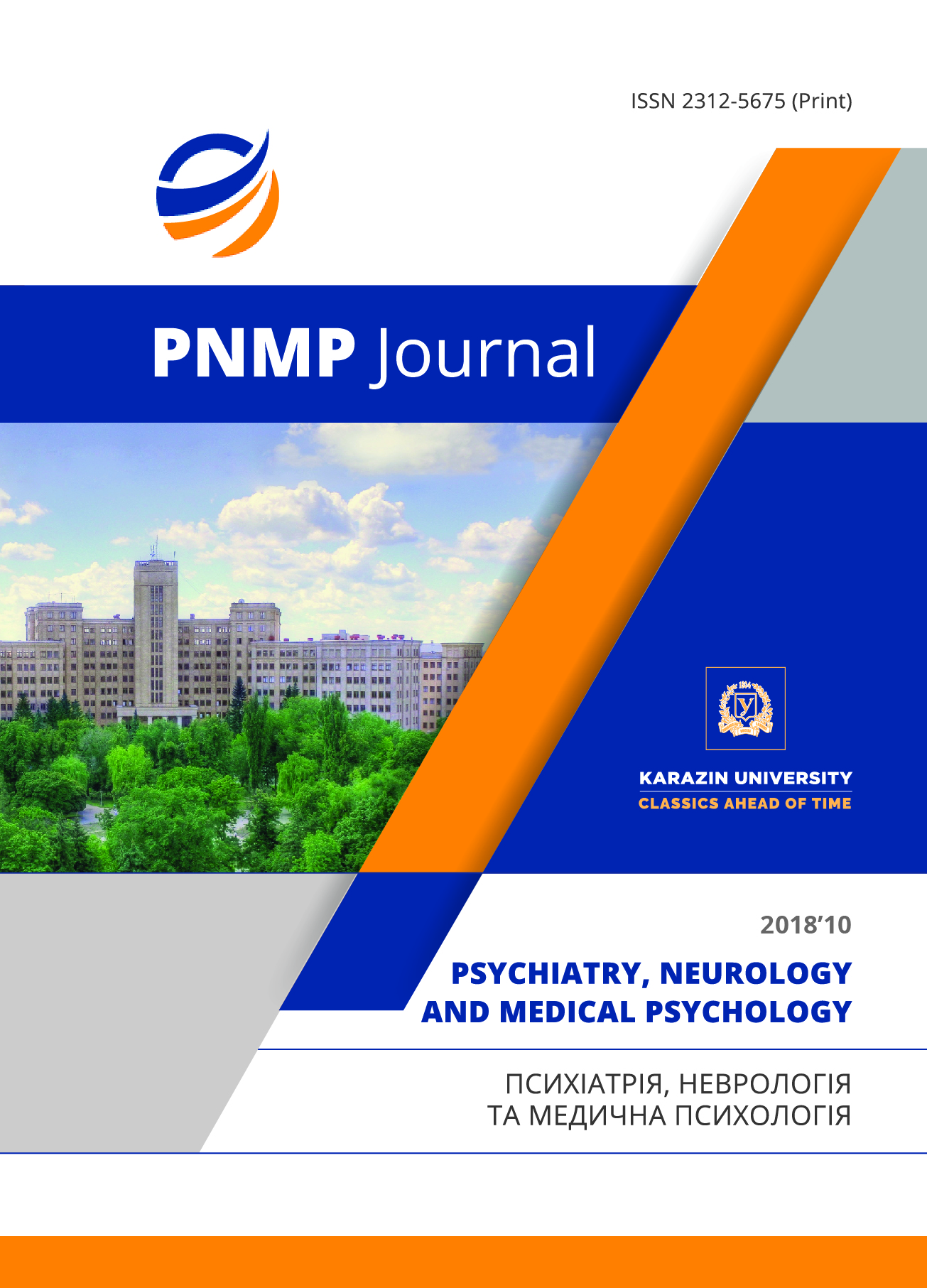Features of psychosocial functioning of combatants and their wives from different classes marital relationship satisfaction
Abstract
One hundred combatants’ families were surveyed in order to identify the features of psychosocial functioning of the demobilized combatants and their wives and to compare them with the satisfaction of the respondents’ marital relations, to determine the possible sources of maintaining the balances family interaction and objectives for further psycho-corrective work. It was found that despite that all the examined men had previous psychotraumatic experience, and most of them had psychic disorders of post-traumatic content, caused by the post-stress response, the married couples who were satisfied with their family relationship (28%) showed the success of psychosocial functioning by all the investigated criteria (problems with social functioning, social and psychological adaptation, quality of life) as compared to those married couples who were dissatisfied with marital relationships (72%). The obtained data will become the basis for the development of a complex of means of psycho correction and psychological support for the combatants’ families.
Downloads
References
Solomon Z., Waysman M., Levy G., Fried B., Mikulincer M., Benbenishty R., Florian V., Bleich A. From front line to home front: a study of secondary traumatization // Fam Process. 1992 Sep; v. 31(3). P. 289-302.
Francisković T, Stevanović A, Jelusić I, Roganović B, Klarić M, Grković J. Secondary traumatization of wives of war veterans with posttraumatic stress disorder // Croat Med J. 2007 Apr;48 (2). P. 177-184.
Klarić M, Frančišković T, Obrdalj EC, Petrić D, Britvić D, Zovko N. Psychiatric and health impact of primary and secondary traumatization in wives of veterans with posttraumatic stress disorder // Psychiatr Danub. 2012 Sep;24(3). Р. 280 – 286.
Klaric M., Kvesic A., Mandic V., Petrov B., Franciskovic T. Secondary traumatisation and systemic traumatic stress // Psychiatr Danub. 2013;25 Suppl 1:29–36. [PubMed: 23806964]
Zerach G., Greene T., Solomon Z. Secondary traumatization and self-rated health among wives of former prisoners of war: The moderating role of marital adjustment // Journal of Health Psychology. 2013. V. 20(2) doi. org/10.1177/1359105313502563
Dekel R., Levinstein Y., Siegel A., Fridkin S., Svetlitzky V. Secondary traumatization of partners of war veterans: The role of boundary ambiguity // J Fam Psychol. 2016;30(1):63–71. doi: 10.1037/fam0000163. [PubMed: 26618520].
Yager T.J., Gerszberg N., Dohrenwend B.P. Secondary Traumatizationin Vietnam Veterans’Families // J Trauma Stress. 2016; 29 (4):349–55. doi:10.1002/jts.22115. [PubMed: 27529559].
Маркова М.В., Росінський Г.С. Порушення здоров’я сім’ї демобілізованих військовослужбовців учасників АТО: психопатологічний, психологічний, психосоціальний і сімейний виміри проблеми // Український вісник психоневрології. 2018. Том 26, випуск 1 (94). С. 78 – 82.
Jordan B.K., Marmar C.R., Fairbank J.A., Schlenger W.E., Kulka R.A., Hough R.L., Weiss D.S. Problems in families of male Vietnam veterans with posttraumatic stress disorder // J Consult Clin Psychol. 1992 Dec. V. 60(6). P. 916-26.
Kimhi S., Doron H. Conscripted without Induction Order: Wives of Former Combat Veterans with PTSD Speak // Psychology 2013. Vol.4, No.3, 189-195 http://dx.doi.org/10.4236/psych.2013.43029
Доморацкий В. А. Медицинская сексология и психотерапия сексуальных расстройств. М.: Академический Проект; Культура, 2009. 470 с.
Карвасарский Б.Д. Клиническая психология. Учебник. М., 2004.
Райгородский Д Я. Практическая психодиагностика. Методики и тесты. М.: Бахрах-М, 2011.
Марута Н. А., Панько Т. В., Явдак И. А., Семыкина Е. Е., Колядко С. П., Каленская Г. Ю. Критерий качества жизни в психиатрической практике / Под общ. ред. Н. А. Маруты. — Харьков: РИФ Арсис ЛТД, 2004. — 240 с.

